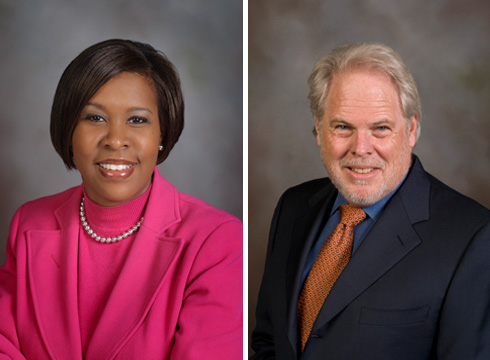Human Resources' professionals lead advances in aging workforce and change management

Several Virginia Tech professional faculty members are making significant contributions to knowledge in their fields and raising the visibility of Virginia Tech in the process.
Mekeisha P. Williams
Mekeisha P. Williams, executive director of Office of University Organizational and Professional Development, in the Department of Human Resources, is known regionally for her work with leadership development, program development and evaluation, succession planning, and leadership coaching.
In July, Williams spoke at the annual conference of the College and University Professional Association for Human Resources (CUPA-HR). Williams spoke to a group of human resource professionals from across the country about a common and increasingly urgent issue for the academic community -- the “graying of the workforce.”
Williams talked, in part, about the cutting edge ways that Virginia Tech is addressing the gaps left in university infrastructure, as well as the preservation of institutional knowledge, as more and more of the university’s key leaders reach retirement.
Under her direction, Virginia Tech has established a succession planning approach that includes the Executive Development Institute, a senior level institute and, more recently, the Management Academy, a mid-level institute to address the talent development of faculty and administrative leaders focused on this pending crisis surrounding succession planning.
Currently, one-third of the American workforce is made up of baby boomers, and the Bureau of Labor Statistics estimates that number will climb in the next few years, according to AARP.
“Very few universities are actively addressing this issue,” said Williams. “Virginia Tech is unique in its holistic approach. Ours is the only program working with multiple levels of upcoming leaders both faculty and administration as an approach that provides development opportunities at varying levels in the university.”
Jim MacQueen
Jim MacQueen, an organizational development consultant in the Office of University Organizational and Professional Development, is known internationally for this work in organization analysis and intervention, change management, brand/culture transformation and systems thinking.
He recently spoke to two groups of scholars and practitioners who also work with organization’s to improve their performance and the individual performance of their employees. At Virginia Tech, MacQueen works with various both academic and administrative groups across the university to help them improve organizational capacity and performance.
Using academic research and case studies from his own practice, his presentations at the International Conference on Knowledge, Culture and Change in Organizations, and the annual conference of the Organization Development Network presented his colleagues from around the world with advances in practice and theory benefitting scholars and working experts in their respective fields.
In the first of his presentations – this one to an audience of academic professionals – MacQueen presented a new theory of how organizational culture is formed and changed. For the second audience of practitioners, he shared advice with his colleagues about the use of causal loop diagrams as a practice improvement technique.
Since their presentations, both Williams and MacQueen says they have fielded dozens of call and emails from practitioners across the country and around the world that are looking to Virginia Tech as a leader in the field of organizational and professional development.
As the commonwealth’s most comprehensive university and its leading research institution, Virginia Tech has more than 13,000 full and part-time employees and is the largest employer in Montgomery County, Virginia. The Department of Human Resources is committed to supporting a high quality of work life for staff and faculty located at the main campus in Blacksburg, Virginia, as well as those at off-campus educational facilities in six regions, a study-abroad site in Switzerland, and a 1,700-acre agriculture research farm near the main campus.








